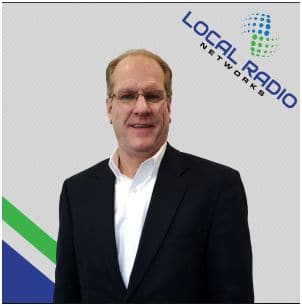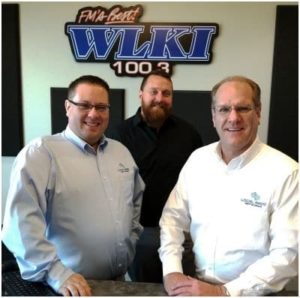
Steve Swick is all about local. He’s about local when he’s running his eight radio stations. He’s about local when he’s dealing with his clients at Local Radio Networks. And he’s not a happy man when roadblocks are put in his way when he’s trying to execute great local radio.
Swick owns stations in Indiana, Ohio, and Michigan. He is also the founder, president, and CEO of Local Radio Networks. He launched the company two years ago, when his frustration with working with existing networks reached a boiling point. He felt they weren’t providing adequate customer service, and they had an attitude of “Where else are you going to, go little guy?”
Local Radio Networks is located in Michigan and provides 24/7 radio programming to small- and medium-market stations, helping them reduce operating costs and maximize localized content. Most people who get frustrated by poor customer service will simply hang up the phone, muttering obscenities. Steve Swick launched a competitor.
Radio Ink: How did you first get involved in the radio business?
Swick: The original owner who started the terrestrial group I acquired in 2008 started it in 1974, and I grew up with all these radio stations back here in the Michigan, Indiana, Ohio market. I was involved with national racing, and between Indy car and NASCAR, I was tired of being on the road 300 days a year.
I started calling Tom Andrews, who owned Lake City Broadcasting, and saying, “Hey, can we talk about me acquiring the radio stations?” He would say, “Nah, I’m not ready. Give me six months.” So I would give him three months. When I was back in town I would take him to dinner, and he really wasn’t ready to pull the trigger.
This courtship went on for five or six years. He finally called me, as his health had started to deteriorate slightly, and he had no succession plan and despised the big conglomerates. He called and said, “Let’s meet and see if this can be put together.” So we did. We worked out all the financial details and closed in September of 2008.
Interestingly enough, 20 days later the world economy tanked and I said, “Great, what did I just do, spending $4-plus million?” The end of that story was we persevered, hunkered down, I grew and expanded the company to include eight terrestrial radio stations throughout Michigan, Indiana, and Ohio, and exceeded numbers that rivaled the previous owners. I love my small radio group. It is a fun business to be in.
Radio Ink: What cities are your stations in, and how are they doing ?
Swick: We are in Sturgis, Michigan; LaGrange, Indiana; Angola, Indiana; and Bryan, Ohio. We also have some translators and HD frequencies in the markets. They are doing extremely well. It had been said over the years prior to my ownership that we had the crown jewel of small-market radio stations. The group was started in 1974.
Radio Ink: What is it like being a small-market operator?
Swick: The biggest thing is you are certainly community-involved. You get to be a big fish in a small pond. We are the go-to source for all local news information, community support, and community involvement. It’s a great way to pay it forward. I always say we are only as good as our listeners and advertisers allow us to be. We try to do the best job that we possibly can and be a good community friend in the region.
Radio Ink: How do you find people who want to stick around and work at radio stations in communities that small?
Swick: I am fortunate to have some of the folks that I inherited when I acquired the company who are still working here. Some of them have been working here since the 1970s. I brought in additional team members as I grew and expanded the company.
Here in Northern Indiana, we are right at the crossroads of I-69 and the AB 90 toll road. It’s branded as the “Land of 101 Lakes.” So the quality of living here is amazing. We do have people moving from some of the big metro areas, not only for my terrestrial side, but for Local Radio Networks. That talent pool has expanded itself with the two mediums.
Radio Ink: How important is being live and local for you?
Swick: It’s everything. If you give up those very elements of being live and local, and the community involvement, you are nothing more than a jukebox. You can get the music anywhere, whether it was 50 years ago with a reel-to-reel, with cassette or CD, or downloads today. It’s all about localism. If you give that up, you are out of the game.
Radio Ink: You owned eight stations, then decided you wanted to launch another company. When and why did you do that?
Swick: As a small-market operator, we used the networks a lot. And as they have been rolled up by the Wall Street conglomerates, we see complacency and a lack of attention to detail. It was my breaking point. There were many phone calls with all the highest-level executives, and it was all falling on deaf ears. I finally had enough. I said, “You guys better start listening to what we’re saying because we are paying your bills.”
The positive thing that came out of it — yes, we are small-market radio, but also, with the depth of my team, we have some of the most brilliant radio and software engineers. We said we’d had enough and we embarked on developing our own proprietary software technology and launched Local Radio Networks.
Radio Ink: How difficult was it to get started, to get the people, the equipment and technology?
Swick: In 2012 we embarked on five years of software development technology, all internally. Everything has been written by radio broadcast engineers for radio broadcasters. When we talk about the coding and software that was written for LRN, we know and understand every facet of the end use of a radio owner, how that will interface with him, tying it around localism with full customization. It provides you as much control or as little control as you want as a radio owner-operator utilizing the 24/7 format through us.

Radio Ink: Tell us exactly what you are offering stations.
Swick: We have 12 different formats, all 24/7. With all that had gone on with Cumulus and iHeartMedia, etc., we started hiring back all this national talent at LRN. We have a complete library of all uncompressed audio, flexible clocks, no mandatory-fill positions. We provide 100 percent redundancy, so if you have a power failure, a fire, a flood, a hurricane, etc., we have everything backed up virtually in our system.
As long as you have a stream connection to us that is the highest quality, we have our own VPN-based technology that we use as our delivery system and we can have you back on air. Our competitors did not have that capability.
Radio Ink: You were five years in development and now two years in the market. How did everything start off?
Swick: We have a mix of folks that came to us, all small- and medium-market station owners.
Radio Ink: Getting customers and making the sales calls — is that coming easy? Do you find more people looking for the product than you expected?
Swick: They have been seeking us. We just came back from Austin, and that was very fruitful for us as well. We feel we are some of the best-kept secrets in this space for small- and medium-market owners.
That being said, Donna Halverson, our national sales rep, has done an amazing job with the outreach she has. Radio station owners/operators are reaching out to us. It is a good thing. We are more than capable of handling from one station to 20 stations at a time if they join the network.
Radio Ink: What kind of feedback are you getting?
Swick: I get direct calls from operators who say, “You do not have the Wall Street corporate mentality. You do understand what it’s like to be a small-market owner.”
We took it totally to the opposite. We are about attention to detail, affiliate relations, localization, and true customer service that we believe is second to none. The feeling we get from the affiliates is that we are on the same page. We understand what it’s like to be on that side of the fence.
Radio Ink: How big do you want to get?
Swick: Well, there are 15,000-plus radio stations — we don’t know where it’s going to go. I know there are a tremendous number of affiliates in the pipeline waiting for contractual agreements to lapse to get out of those contracts. As soon as those expire, there is a tremendous amount in the pipeline ready to come to LRN.
Radio Ink: Most people who own eight radio stations and get frustrated with a network are not going to go out and start their own. What was it about you that not only made you say it, but do it?
Swick: There is no question I am extremely competitive. You don’t settle for something that’s not up to par. You push hard and work hard to produce the best possible product for the listener. I was not settling for what the industry had to offer. But where else are you going to go? It’s almost like you don’t have a choice, you are stuck with them. Well, that wasn’t a good answer for me.
When you turn million-dollar sticks over to a provider, you are turning over your baby, and you still have all the risks and responsibility. Like I said, that did not work well for me, when I had those signals and sounds coming from the corporate mentality of that space at that time. I just said, “We are better than this.”
That’s why we embarked on LRN. We have a great strategic partnership with AdLarge Media — Gary Schonfeld and Cathy Csukas are great folks. They do all the ad barter representation. The team of LRN is expanding and growing. Most recently we hired three key individuals from Westwood One and brought them over to our team. There will be others as this grows bigger.
I can tell you, the folks who left 20- or 25-year careers with those organizations left for a reason. It was because of what we just explained, the complacency and lack of attention to detail. The folks I brought over are the people we want on our team.
Steve Swick can be reached at [email protected]





